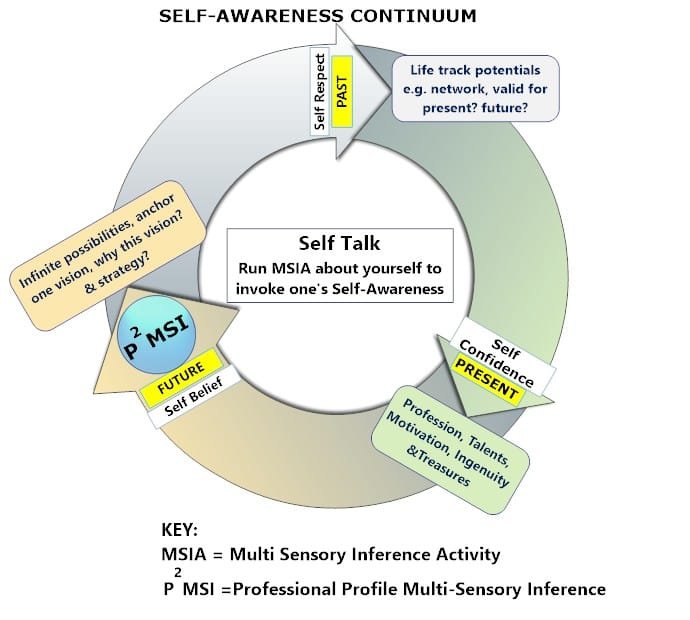Definition of Trust
Trust is the greatest catalyst for success. It is not just a tool—it’s an incentive in itself. In high-trust organizations, employees are inspired to perform at their highest capacity. While trust is rare in the vicious cycle, it is foundational in the virtuous cycle of growth and innovation.
Trust Illustration
The self-awareness (self-talk) continuum diagram is a way of thinking depicted in Figure 1, calling for powerful creativity. It is a continuous thinking process of the past, the present, and the future. The past represents self-respect, present self-confidence, and future self-belief. MSIA (Multi-Sensory Inference Activity) and PPMSI (Professional Profile Multi-Sensory Inference) are the thinking processes in creative imagination. For details, refer to the “Spiral Influence: The Modern Blueprint for Business Growth and Leadership.” eBook.

The Power of Trust: Self-Awareness Continuum
The self-awareness continuum (see Figure 1) illustrates a continuous process of thinking across time—past (self-respect), present (self-confidence), and future (self-belief). This inner dialogue, or self-talk, activates powerful creativity through Multi-Sensory Inference Activity (MSIA) and Professional Profile Multi-Sensory Inference (PPMSI). These tools are further detailed in the Ultimate Enterprise eBook.
Trust is rated as an asset in the Personal Influence Scanner (PIS), while self-deception is considered a flaw—making trust a measurable element on a metaphorical balance sheet of personal and organizational health.
Trust in Leadership and Enterprise
Trust is the single most effective catalyst for exceptional performance across politics, economics, leadership, and management. It fosters fairness in leadership, encourages original thinking, and strengthens accuracy in managing goods, services, and systems. In fact, productivity is directly linked to the level of trust—demonstrated by its tangible, monetary impact.
Clarifying Trust
You can recognize high-trust organizations by observing how employees treat one another—with honesty, respect, and mutual regard. Trust emerges from situational events and shared history, shaping future behavior.
Definition:
“Trust is a reciprocal relationship where individuals willingly release control over internal engagements, based on a history of impeccable behavior.”
Trust, then, is not merely a commodity—it’s a high-value asset that builds sustainable relationships.
The Four Elements of Trust (in PIS Framework)
Trust expands across both the Individual Spectrum (IS) and the Public Spectrum (PS) through the following intelligences:
IS: Si + CiMi → Spiritual intelligence + Cognitive intelligence under moral guidance
PS: Ei + CiLi → Emotional intelligence + Cognitive intelligence under legal compliance
Orientating Intelligences: Si & Ei
Spiritual Intelligence (Si)—or existential merit—guides alignment with shared purpose, mission, and vision. Emotional Intelligence (Ei) supports empathy, connection, and morale. Together, they establish cohesion and a thriving organizational spirit.
PTR (Personality Tetra Receptor) ensures that the organization’s values resonate with its people—driving trust and belonging.
Implementation & Control Intelligences: CiMi & CiLi
CiMi and CiLi put vision into action—where CiMi aligns personal morality with cognition, and CiLi applies legal standards to public behavior.
Together, these govern synergy—transforming 1 + 1 into 3.
Team members embodying these principles foster trust through:
– Empathy and forgiveness
– Personal and collective accountability
– Ethical alignment with shared purpose
Allegiance: Trustworthiness in Action
Trustworthiness is the result of earned respect through consistent behavior. It involves re-imprinting the four pillars of trust:
1. Reasonable Mind (Emotional-territorial outlook)
2. Shared Vision (Bio-survival needs)
3. Partner Confidence (Cognitive values)
4. Sound Ethics (Validity of actions)
This transformation requires ideological re-imprinting—the more complex of the two healing processes, as it requires self-honesty and the courage to change.
Physical Healing vs. Ideological Re-imprinting
Physical healing is straightforward—like treating a wound or infection. Ideological healing, however, involves confronting internal contradictions and reshaping beliefs.
History shows us that unchecked weak personalities can lead to large-scale destruction. Aligning individuals with the Personal Influence Scanner (PIS) helps identify and correct these flaws—often rooted in public deception or self-deception.
The Journey to Trustworthiness: Self-Awareness
Self-awareness emerges through self-talk—a process of engaging past (self-respect), present (self-confidence), and future (self-belief).
Self-Respect: Reflecting on your life path, training, and influences
Self-Confidence: Recognizing your talents, values, and network
Self-Belief: Acting with faith in your vision and ability to perform
When these elements align, they form integrity—the consistent thread from thought to action.
Integrity: The Chain of Trust
Integrity connects your internal MSIA process to real-world impact. It means living by values and principles that ensure long-term sustainability.
If a system becomes unsustainable, MSIA reconfigures the principles to restore balance—this is the domain of high IS thinkers.
Values, Principles, and Attitudes
Values: Filters shaped by past imprints, guiding behavior
Principles: System-level truths that ensure sustainability
Attitudes: Responses rooted in comfort zones or ethical alignment
Understanding these helps us design visionary business models, detailed in the Strategy Link section.
Trust and Motivation
Trust unlocks motivation. Defined as:
“A force that influences individuals or groups to think or act in alignment with a motivating cause.”
Motivations can be internal (psychological) or external (performance-based)—topics explored in the Leadership section.
Mature Society Member (MSM)
The ultimate expression of trustworthiness is becoming a Mature Society Member—one who leads, collaborates, and influences with intelligence and integrity. MSMs embody Si, Ei, CiMi & CiLi as a harmonious system.
They:
– Recharge personal energy
– Navigate difficult problems
– Align with the Ultimate Enterprise Thinking (UE Thinking)
Final Reflection
Trust isn’t just about believing in others—it’s about building a foundation of integrity, values, and clarity within us. Through trust, we unlock synergy, elevate performance, and lead organizations toward sustained excellence.
